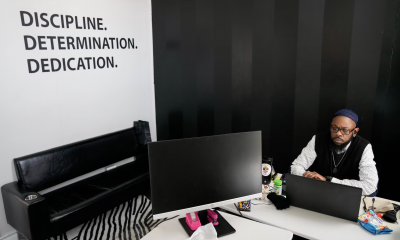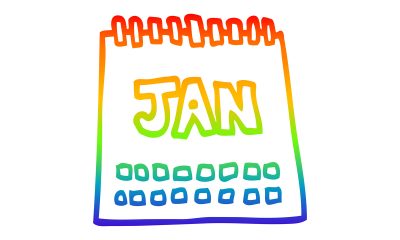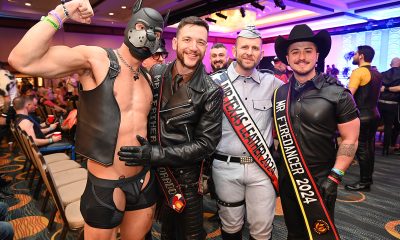Living
Country roads, take me home
New W.Va. gay club hopes to succeed where others nearby have failed
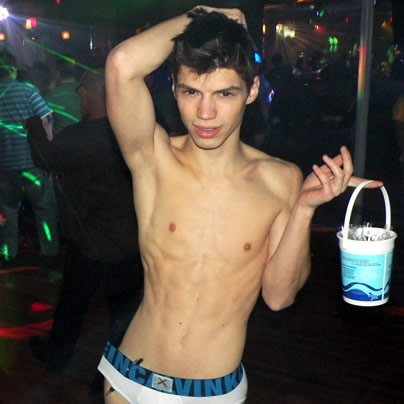
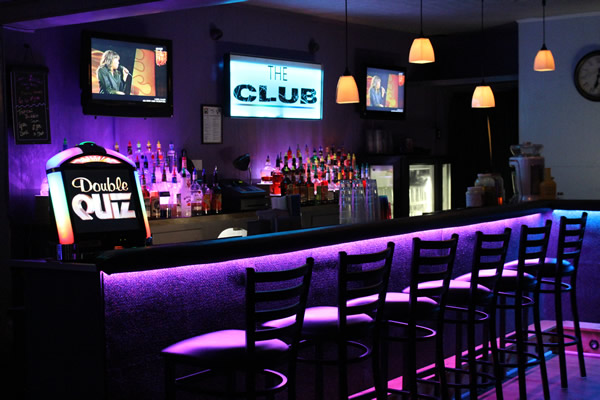
A recent night at The Club, a new gay bar in Martinsburg, W.Va. (Photo by Dale Gish)
MARTINSBURG, W.Va. — Gay-popular entertainment districts are almost always found in major metropolitan areas, but there’s a smattering of clubs and restaurants in the close-by regions of Maryland’s Cumberland Valley and West Virginia’s Eastern Panhandle that are drawing decent-sized crowds despite being more than an hour from either Washington or Baltimore.
For decades, The Lodge in Boonsboro, Md., has been pretty much the only gay nightclub in the region. Formerly known as Deer Park Lodge and at times closed altogether, it’s been thriving again under new management since 2011 when partners Ryan Dryden and Joe Velazquez moved from Washington to reopen and run it.
Since January, it’s faced some competition as The Club (theclubwv.com), a new gay bar/club in Martinsburg, W.Va.’s Spring Mills area (about 21 miles from The Lodge), took over a large spot formerly known as straight bars Ambitions and before that, Gatsby’s. Owner Coby Myers, a gay sheriff in West Virginia, has his gay friends Jarvis Jerry Brooks and Dale Gish running the operation. They say, so far, business has been good and that they’re carving out a niche for themselves in the region by offering strong customer service, a “family”-type atmosphere and a clean and newly remodeled space. It’s about 80 miles from Dupont Circle.
“A lot of people feel it’s just easier to get instant gratification now on the Internet,” says Brooks, who DJs at The Club in addition to booking talent and planning events. “I think my thing is just that a lot of clubs have forgotten the whole aspect of a family feel, where everybody knows your name and there’s a home bar feel to it. You’re not just a number, you’re not just a door cover, there’s more to it than that.”
But can it last? Are there enough LGBT residents in these parts of Maryland and West Virginia to support two small-town gay clubs? A few others have come and gone in recent years. The Mariner Club, locals say, had a decent run for a few years on Martinsburg’s Winchester Ave. It was across the street from Sugar Daddy’s, a male strip club that, although not technically gay, had gay strippers and more gay male patrons than straight women. But both are now closed.
And more recently Spin/Club Underground, which was in downtown Hagerstown just a few doors down from the historic Maryland Theatre, died a relatively quick death after being open less than a year. Brooks, who DJed at the gay club (his DJ name is Jerrbear), says business was “hit and miss.”
Those involved say they see a brighter future for The Club.
“For one thing, it’s not mismanaged,” says Ray Stagner, a drag queen who performs as Cheyenne and who debuted at The Club last Saturday night.
Wearing full drag makeup but dressed in a ball cap, jeans and guy’s T-shirt while puffing on a cigarette in The Club’s downstairs smoking-allowed pool room, Stagner, a Hagerstown resident, says gays and drag performers in the region will support both The Club and The Lodge. Because of liquor laws, The Club can stay open an hour later (until 3 a.m.) on Saturday nights whereas the Lodge closes at 2.
“I think it’s great,” Stagner says. “If people want to go here one night they can, or they may do like we used to do in the old days. As soon as they called last call at Deer Park, we used to bail from Hagerstown and come down here to Gatsby’s once they closed the bars in Hagerstown.”
Last Saturday night at about 10 p.m., The Club had a healthy crowd though it wasn’t packed. The space is mammoth — there’s a large dance area, stage, bar, tables, seating area, downstairs pool room, kitchen and a huge outdoor patio and bar Brooks says they “can’t wait” to use once the weather gets warmer.
“It reminds me of the old Tracks in D.C.,” he says. “There’s so much potential for this space.”
All the interiors have been redecorated since it was Ambitions. The hardwood dance floor, Brooks says, is the one original component — it dates to the 1950s.
A diverse crowd mills about including 20- and 30-ish gay guys, a few older gay men, a few lesbians and a drag queen or two. A few dance, but not many. It’s still early. Several make trips up and down the half-flight of stairs to take smoke breaks. The pool room is less opulent, but the smokers don’t seem to mind. Large industrial smoke eaters keep the room clean and from upstairs it’s impossible to tell there’s smoke in the building.
Gish says the region is large enough that gays are coming from Winchester, Va.; Cumberland, Md.; even Greencastle and Chambersburg, Pa., and that The Club will thrive. Gays from Baltimore or D.C. who want a change of scenery even visit on occasion, he says.
“We’re seeing our weekend door counts increase every weekend,” Gish says. “I think it will only improve as the weather warms.”
There are about 12 on staff but DJs and drag performers are independent contractors. Brooks says they’re seeing about 200 come through the doors on an average Saturday night. A few times it’s gotten close to 300. It’s open Wednesday through Saturday and on weekends there’s a $5 cover. Eighteen-to-20-year-olds can get in anytime but have to pass Breathalyzer tests when they come and go. Gish guesses about 20 percent of the clientele might be “some variation of straight” and says the crowd, because of the smaller overall numbers, is more integrated than in city bars. He says straights, lesbians, bears and twinks all party together here.
Despite rumors of bad blood between The Club and The Lodge, the owners of the latter say they bear no ill will.
“It’s really not a question of competition, it doesn’t matter how many there are in the area, there are more than enough [LGBT people] to go around,” Velazquez says. “So far business has stayed good for us and been pretty good for them. Whether it stays that way, time will tell.”
He says there are even some unexpected benefits at times.
Of The Lodge’s drag cast, Velazquez says he encourages them to perform at other bars.
“They get fans who will then follow them from show to show and we have some people who only show up for the drag shows, so it’s good for them to be out at different bars in the area,” he says. “I have no problem with it. It’s a free world. If I wanted to have them sign an exclusivity contract, I would, but we don’t.”
There are also a few gay-owned restaurants in the region — the Gourmet Goat and Georgia Boys Café in Hagerstown, and Café Izmir in nearby Funkstown, Md.
The Goat, (41 North Potomac Street), has been in its present location for seven years and is known for its vast array of martinis. Owners Steve Cook and Paul Deputy live on site and run it “very much hands on,” Deputy says.
Café Izmir is owned by Nihal Mizah, who’s straight. The cafe became an LGBT destination of sorts during the time The Lodge was closed. Lesbian Karla Auch helps her manage it.
Gish says he thinks it’s more than a coincidence. Although these areas, he says, will never have the large gay communities Baltimore and Washington have, there are LGBT people here and he says they’re more comfortable being out and open than they were even a decade ago.
“I think there’s a social change happening,” he says. “And not just in the media, but in families too and the culture in general. It’s becoming more accepted to be gay and be open about it, or lesbian, or bi or trans or whatever you are. Society is becoming more accepting and these business owners want to pursue their dreams without feeling that they’re going to be persecuted. I know all these business owners and I support them all and wish them the best.”
Real Estate
Stress-free lease renewals during winter months
A season when very few tenants typically move
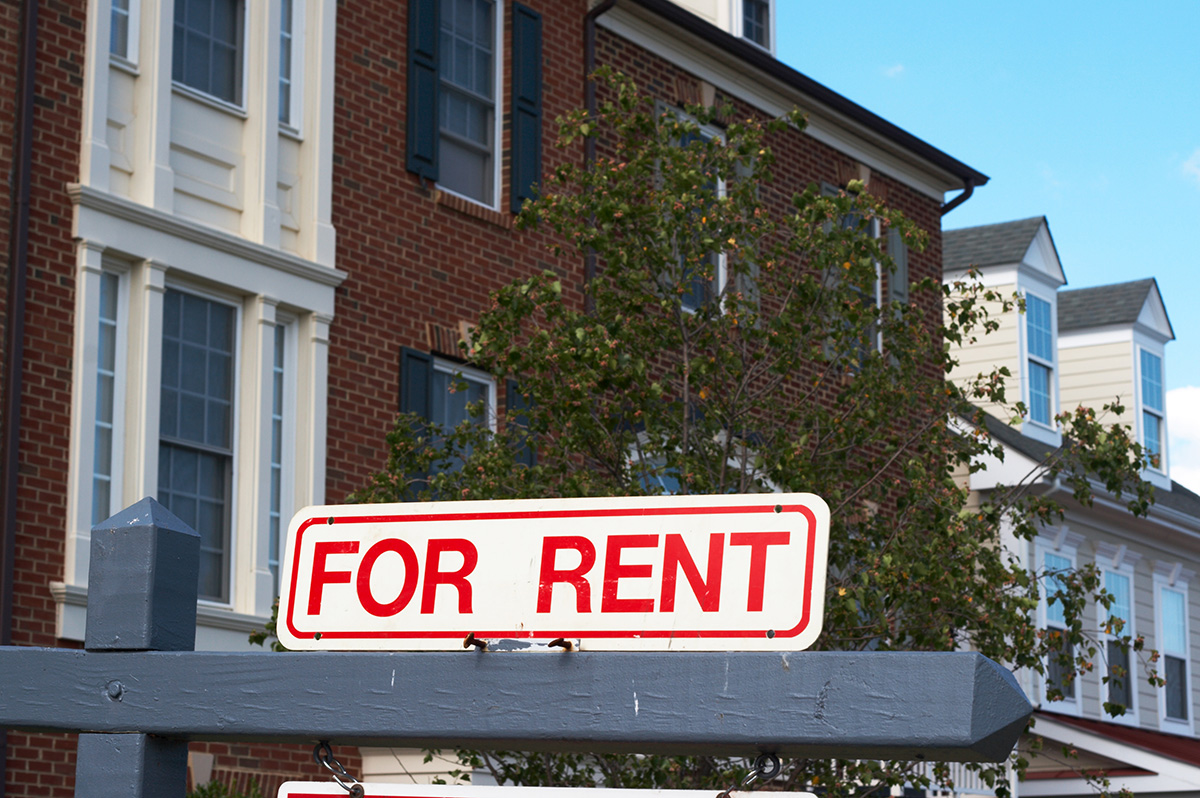
January has a way of waking everyone up. After weeks of holiday noise, travel, family visits, and a general blur of activity, the new year arrives with its usual mix of resolutions, optimism, and responsibility. People start looking at their calendars again. To-do lists reappear. And tucked away in there is something many tenants didn’t give much thought to in December, their lease renewal.
Renewals in winter matter more than most people realize. It is a season when very few tenants typically move. The weather is unpredictable, schedules are tight, and most people are trying to regain their footing after the holidays. Because of this, renewal conversations tend to be more productive and more grounded.
Many landlords think of spring and summer as the heart of leasing season, and while that’s certainly when moves are most common, winter renewals hold their own kind of importance. A well-timed renewal does more than keep a unit occupied. It provides predictability for the year ahead, strengthens relationships, and reduces the costly turnover that smaller landlords want to avoid.
In my experience, tenants who might hesitate during another time of year are often relieved to secure housing before the pressures of spring and summer begin. Uncertainty is one of the prime causes of unnecessary turnover. If tenants don’t hear from their landlord, they often start browsing listings “just in case,” or asking friends about other options. Once that door is opened, it can be hard to close. Initiating the renewal process early helps anchor tenants before doubts start creeping in.
Tenants often make clearer decisions in January than they would in November or December. During the holidays, people are distracted and stretched thin; emails are skimmed, not absorbed; and anything involving planning often gets deferred until “after the new year.” When tenants return home in January, they have a better sense of their plans, their budget, and their needs for the coming months. This makes it a much easier moment to start or restart a renewal conversation.
The practical reality is that most tenants don’t want to move in the winter. Who wants to haul furniture across icy sidewalks or deal with last-minute moving delays due to storms? Beyond the weather, January is a time when people are reorganizing finances, filing paperwork, and settling into routines. The thought of a major transition simply doesn’t fit. Landlords can use this natural reluctance to create a smoother, more collaborative renewal process.
One thing I’ve learned over the years is that clarity is a landlord’s best tool. Tenants don’t need lengthy explanations, legal jargon, or complicated attachments. They simply want to know:
- Are the terms changing?
- If so, how?
- What does their timeline look like?
- Would the landlord consider another set of terms?
A concise, well-laid-out renewal offer does two things. First, it demonstrates transparency, which builds trust. Second, it keeps the conversation focused and productive. When tenants understand exactly what’s being proposed, there is less back-and-forth, fewer misunderstandings, and a quicker path to a signed agreement.
Tenants are more receptive when they feel they’re being treated fairly and openly. If there’s a rent adjustment, a brief explanation helps tenants see the reasoning behind it, such as increased operating costs, significant maintenance completed during their stay or alignment with the market.
Lease renewals are moments of connection. The best landlord-tenant relationships are built over time through small exchanges, transparency, and mutual respect. Renewal season offers an opportunity to reinforce that.
A simple acknowledgement of the tenant’s care for the home or their timely payments can set a positive tone. Even a short note of appreciation signals that you see them not as a lease term, but as a partner in maintaining the property. These gestures cost very little but create a sense of goodwill that carries through maintenance requests, policy reminders, and everyday communication.
Many landlords underestimate how much tenants value being treated as individuals rather than account numbers. A thoughtful, personal touch during the renewal process can make a tenant feel recognizednand more inclined to stay.
Renewals aren’t only about securing another term lease.They’re also a natural moment to check in on the overall health of the property and the tenant’s experience. J anuary provides a quiet space to step back and ask:
• Are there maintenance concerns the tenant hasn’t mentioned yet or that have not been fully resolved?
• Is the property due for upgrades or any preventative work?
• Are there responsibilities or expectations worth revisiting?
These conversations don’t need to be long or formal, but they help prevent the small issues of one year from becoming the larger problems of the next. A tenant who feels heard is more likely to take good care of the home, communicate proactively, and renew again in future years.
While landlords must maintain structure and protect their assets, a bit of flexibility can go a long way during the renewal process. Tenants are often rebalancing budgets after holiday spending. Offering digital signatures, Having brief calls to clarify terms, being flexible, or a few extra days to make a decision can ease stress without compromising the landlord’s position.
Flexibility is about recognizing human realities. Most tenants appreciate being treated with patience and professionalism, and often reward that consideration with prompt decisions and smoother communication. There are many reasons why a full year renewal may not coincide with their plans. Being able to work out mutually agreeable renewal terms makes the solution a win for both parties.
For landlords, especially smaller ones, stability is the foundation of successful property investing. A vacant unit, even briefly, costs more than most people realize. There are marketing expenses, cleaning, repairs, lost rent, and the unpredictable timeline of finding the right new tenant. By contrast, securing a renewal with an existing reliable tenant protects cash flow, reduces risk, and creates predictability in planning.
January renewals, when handled well, deliver this stability right at the beginning of the year. They give landlords a clear roadmap for budgeting, maintenance scheduling, and forecasting. They also give tenants the security of knowing exactly where they stand, which reduces stress on both sides.
A lease renewal may seem like a small moment in the life of a property, but in practice, it shapes the experience of the year ahead. When the process is organized, honest, and respectful, it sets a tone that carries through every interaction until the next renewal date.
January is a time to consider leaning into this approach. The pace is slower, the mindset is clearer, and both landlord and tenant are ready to step into the year with more intention. A renewal handled thoughtfully now paves the way for a smoother, quieter, more predictable twelve months, something every landlord and every tenant can appreciate.
Scott Bloom is owner and senior property manager at Columbia Property Management.
Advice
How to cope when a partner gives you the silent treatment
Punishing behavior brings up memories of parent’s mistreatment
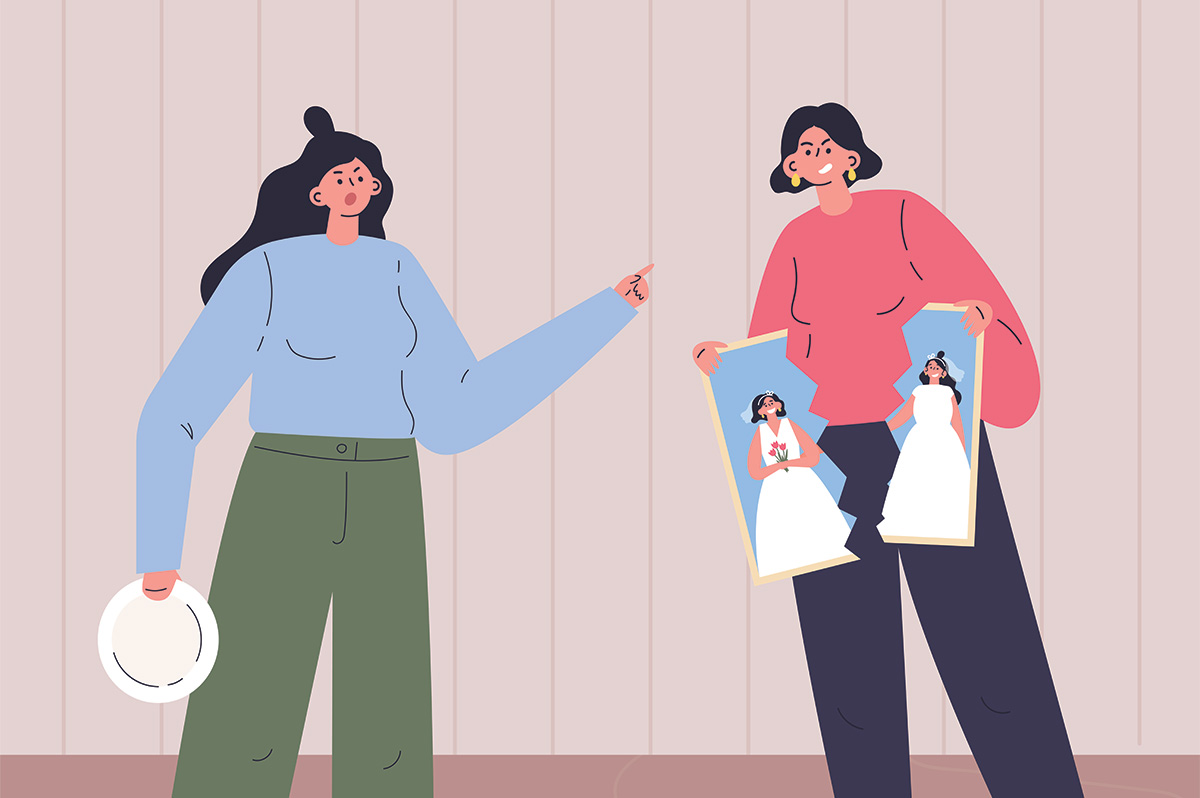
Michael,
My wife and I met less than two years ago and we were crazy about each other from the start. We wanted to spend life together so we just went for it. Maybe this wasn’t the most well-thought out decision on either of our parts but we thought that love conquers all.
But lately we’ve been arguing. The stuff we’re fighting about is never such a big deal: chores, or spending, or wanting to do different things on the weekend. But when I don’t want to go along with Michelle’s point of view, she gets angry and shuts down. Sometimes she stops talking to me for as long as a few days.
This is painful for me. My mom used to pull this stunt when I was a kid and she was mad at me. She also cut me off when I came out. We’re still estranged.
Michelle has a whole different take on this. She says I am being “mean” to her (when I don’t go along with what she wants) and this is painful, and she has to “take a break” to cool off.
I know she comes from a volatile family. She has told me there was a lot of screaming in her house, and she barely has a relationship with her parents as a result. So I get that she’s sensitive to conflict.
But I don’t think I’m being mean to her by standing up for what I want — certainly not enough to warrant her giving me the silent treatment.
We got married to have a great life together. We often do but I can’t live with someone who just shuts me out when she’s annoyed with me.
If I became a doormat and went along with everything she wants and never pushed back or complained, maybe she wouldn’t shut down. But I don’t want to do that.
I’d appreciate some ideas to improve the situation. I don’t want a divorce but I also don’t want to keep being mistreated.
Michael replies:
You can think of marriage — or any serious relationship — as a gym where you have ongoing opportunities to become an increasingly resilient person in the face of the ongoing challenges that an intimate relationship poses.
Your task here is to shift your focus toward figuring out how to handle yourself well, even in the awful circumstance of getting the silent treatment.
Michelle is not under an obligation to behave as you’d like her to. You can certainly ask her to stop withdrawing when she’s angry at you. But that doesn’t mean she is going to honor your request.
I well understand that Michelle’s punishing behavior is bringing up painful memories of your mother’s mistreatment. But if she doesn’t change her behavior, you have to find a way to live with Michelle as she is, with as much equanimity as you can muster, for as long as you choose to be married to her. If she does not change and you find her behavior to be unbearable, you can leave.
Every time she shuts down, Michelle is handing you an opportunity to figure out how you, yourself, can deal with feeling hurt and let down, rather than depending on someone else to behave as you’d like her to, or not upset you, or soothe you. Being in charge of your own mood rather than letting someone else press your buttons is a great skill to get better at.
I’m not going focus on what techniques you might use to soothe yourself — that’s a different column (or even better, a number of therapy sessions). That said, knowing that Michelle’s behavior comes from her history might help you to take it less personally. And, simply keeping in mind that living with a difficult spouse is unavoidable and worth getting better at may help you to quiet yourself down.
Another challenge that your marriage is pushing you to work on: Discerning when you can be generous, and when it is important to have a boundary. Of course, I understand that you don’t want to be a doormat by going along with whatever Michelle says and wants. But is it possible that she has a point, in that you could stand to lean more in her direction?
None of us get to have everything the way we want when we are in a relationship (much less in life). Figuring out the interplay between generosity and boundary is complicated. It often involves considering what is important to your partner; and deriving joy from her getting some of what is important to her, not only from your getting what you would like. And of course, it also involves figuring out what is most important to you.
If you set a boundary thoughtfully, because something is important to you, and Michelle doesn’t like it, you’re being handed an opportunity to get better at tolerating disappointment. Being a disappointment to your partner, and being disappointed in your partner, are both unavoidable parts of marriage: We’re all different, and at times will make choices that the other person really does not like.
If we make our decisions from a place of integrity rather than whim, entitlement, anger, or “whose turn it is”, and strive to honor the choices that our partners make from a place of integrity, this often makes the disappointment easier to bear.
Of course, it would be great if Michelle would join you in working to become a more solid and resilient spouse. As I mentioned earlier, you can’t persuade her to do so. But you can certainly tell Michelle what you are working on and ask her to consider how she, too, might use your relationship difficulties as a challenge to grow.
It isn’t easy to have such a conversation without sounding condescending. You are better positioned to do so when you are walking the walk, not just talking the talk. One good rule of thumb is to put you and your partner in the same boat, making it clear that you see the two of you as facing the same challenges, rather than positioning yourself in a superior position. Another is to initiate the conversation when you are both calm, rather than in the middle of a fight or when you’re getting the silent treatment.
One more point: If Michelle is willing, I’d suggest that you propose couples therapy as an opportunity for you two to collaborate on building a consistently loving relationship where neither of you lets your reactivity run the show.
Michael Radkowsky, Psy.D. is a licensed psychologist who works with couples and individuals in D.C. He can be found online at michaelradkowsky.com. All identifying information has been changed for reasons of confidentiality. Have a question? Send it to [email protected].

Electric-vehicle tax credits may have faded earlier this year, but EVs themselves are far from losing their spark. There are more charging stations than ever, battery ranges are longer and more realistic, and automakers have finally figured out that EVs don’t all need to look like geeky science projects or feel like failed beta tests.
Just look at these two compact electrics, which are futuristic, fun and flexible enough for work or play.
HYUNDAI IONIQ 5
$37,000 to $48,000
Range: 245 to 318 miles
0 to 60 mph: 4.5 to 7.4 seconds
Cargo space: 26.3 cu. ft.
PROS: Fast charging. Roomy cabin. Silky-smooth suspension.
CONS: Wide turning radius. Rear wiper not on all trims. Price creep.
After being introduced three years ago, what’s new for the latest Hyundai Ioniq 5? Mostly refinement. Charging is quicker, software is smarter and Hyundai continues to quietly listen to feedback, tweaking ride comfort and usability. Think of it as switching from messy eyeliner to a perfectly sharp wing.
Exterior styling remains one of this EV’s biggest conversation starters. Those pixel-inspired lights, crisp lines and slick hatchback-meets-crossover proportions exude refreshing confidence. There’s no trying to blend in, and that’s the point. Park this Hyundai anywhere and heads will turn.
On the road, the Ioniq 5 prioritizes calm over chaos. Steering is light, the suspension smooths out rough pavement and acceleration feels brisk without being aggressive. Safety tech is plentiful and well-calibrated—adaptive cruise control, lane-centering, blind-spot monitoring—all working together without seeming like a nervous backseat driver. IOW, this ride is supportive, not clingy.
Inside, the user-friendly cabin shines. The flat floor and long wheelbase create a lounge-like atmosphere, with excellent legroom and airy visibility. Seats are well-bolstered and available with eco-friendly materials, and the sliding center console adds flexibility. Cargo space is generous, and the wide windshield makes city driving stress-free. Alas, the rear wiper is only available on select models. Overall, though, I appreciated how everything looks modern without feeling cold.
What makes this Hyundai special is its vibe. An EV that embraces individuality without shouting about it.
Fun fact: The Ioniq’s ultra-fast charging can add hundreds of miles in under 20 minutes—perfect for those who hate waiting almost as much as they hate small talk on awkward first dates.
VOLKSWAGEN ID.4
$46,000 to $59,130
Range: 206 to 291 miles
0 to 60 mph: 4.4 to 7.7 seconds
Cargo space: 30.3 cu. ft.
PROS: Sure handling. Decent range. Good storage.
CONS: Body roll in curves. Fussy infotainment. No frunk.
The latest VW ID.4 focuses on polish. Software updates have fixed earlier frustrations, and overall drivability feels more cohesive. Less “learning curve” and more “hop in and go,” like a dependable bestie who doesn’t overthink things.
Styling-wise, this EV is intentionally inoffensive. Soft curves, friendly lighting and a familiar crossover shape make it approachable. While the ID.4 won’t turn heads like the Ioniq 5, that’s OK. It’s more akin to a classic outfit that always works—timeless, not trendy.
Driving the ID.4 is relaxed and predictable. This SUV prioritizes comfort over thrills, with a suspension tuned for daily commuting and long highway drives. Safety features are comprehensive and reassuring, including excellent lane assistance and collision-prevention systems. It’s the kind of car that quietly has your back, no drama required.
Inside, the ID.4 offers a calm, uncluttered cabin with good space for passengers and cargo alike. Rear-seat legroom is especially strong, making it a solid road-trip companion. The seats are plush, visibility is good and while the infotainment system isn’t the most intuitive, it’s improved enough to be more than tolerable.
The ID.4’s special sauce is balance. It doesn’t try to reinvent the wheel—it just electrifies it.
Fun fact: This is one of the most globally popular EVs, proving that sometimes being universally liked is a strength, not a personality flaw. Think, gold star gay who still surprises you.

-

 Theater5 days ago
Theater5 days agoFord’s ‘First Look’ festival showcases three new productions
-

 Bars & Parties5 days ago
Bars & Parties5 days agoMid-Atlantic Leather kicks off this week
-

 U.S. Supreme Court3 days ago
U.S. Supreme Court3 days agoSupreme Court hears arguments in two critical cases on trans sports bans
-

 Virginia4 days ago
Virginia4 days agoMark Levine running in ‘firehouse’ Democratic primary to succeed Adam Ebbin

